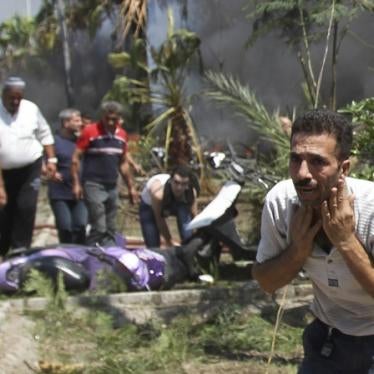(Beirut) – Lebanon in 2013 struggled to manage spillover from the conflict in neighboring Syria and a growing refugee crisis, Human Rights Watch said today in its World Report 2014. The absence of a government for most of 2013 and parliament’s paralysis meant that the authorities failed to pass laws to improve the human rights situation in the country.
As Syrian refugees flood into Lebanon, the government should keep the border open. Lebanon should counter violence and insecurity by establishing a permanent security presence in areas with persistent fighting, arresting and prosecuting people responsible for violence, and confiscating weapons. Donor countries should assist, including by helping the Lebanese authorities meet the basic needs of refugees and of people affected by their arrival.
“The Lebanese government needs more outside help if it is to maintain security and continue to feed, house, and care for the growing Syrian refugee population as well as its own people,” said Nadim Houry, deputy Middle East director at Human Rights Watch. “The authorities should respond to growing insecurity by confiscating weapons and arresting and prosecuting anyone responsible for violence.”
In the 667-page report, Human Rights Watch reviews human rights practices in more than 90 countries. Syria’s widespread killings of civilians elicited horror but few steps by world leaders to stop it, Human Rights Watch said. A reinvigorated doctrine of “responsibility to protect” seems to have prevented some mass atrocities in Africa. Majorities in power in Egypt and other countries have suppressed dissent and minority rights. And Edward Snowden’s revelations about US surveillance programs reverberated around the globe.
Violence from neighboring Syria spilled over into Lebanon in 2013 in the form of car bombings in Beirut and Tripoli, kidnappings, and cross-border shelling. Sectarian tensions aggravated by the conflict erupted in deadly clashes in Tripoli and Saida, in a general climate of impunity for gunmen.
Clashes in Tripoli have resulted in a sharp increase in sectarian attacks against Alawites in the city, including attacks against Alawite workers including while they commute to work, the burning and destruction of Alawite shops, and attacks against Alawite school buses. On May 31, for example, Sunni militants threatened Alawite workers at the Tripoli municipality, sending them text messages telling them not to come to work or face death. Sunni militants also destroyed at least four shops in the Tel neighborhood of Tripoli on June 1 and June 3.
Following heavy clashes in Saida between the Lebanese army and armed supporters of Sheikh Ahmed al-Assir in June, some individuals arrested by the Lebanese army were beaten in custody and, in two cases documented by Human Rights Watch, tortured by being burnt with cigarettes. One resident, Nader Bayoumi, died while in the custody of the military. Available evidence indicates that beatings in custody led to Bayoumi’s death and a military judge has issued arrest warrants for five individuals for beating and torturing Bayoumi to death. Their trial is ongoing.
The number of Syrian refugees registered in Lebanon topped 830,000 in December. With limited international support, the Lebanese government struggled to meet their basic needs for housing, health, and food. According to the Office of the United Nations High Commissioner for Refugees (UNHCR), UN member states, as of October 31, had only funded 51 percent of the agency’s US$1.2 billion appeal for refugees in Lebanon. On November 1, because of budgetary limitations, UNHCR began eliminating basic assistance for 30 percent of the Syrian refugees in Lebanon.
Lebanon is the last of Syria’s neighbors to maintain an open border. In August, though, it instituted a de-facto policy of turning away Palestinian residents of Syria seeking refuge in Lebanon. Human Rights Watch called on the government at that time to maintain an open border for those fleeing death and persecution, and for donors to contribute assistance to enable Lebanon to do so.
Amid the violence and in a crippled economy, Lebanon suffered from a lack of leadership. The prime minister resigned in early 2013, and a new government has not yet formed. That has left the parliament stalled on processing draft laws to stop torture, improve the treatment of migrant domestic workers, protect women from domestic violence, and end discrimination against women under personal status laws.
“Lebanon faced big challenges but the authorities cannot afford to procrastinate on dealing with underlying human rights issues as waiting will only make the situation worse,” Houry said.







